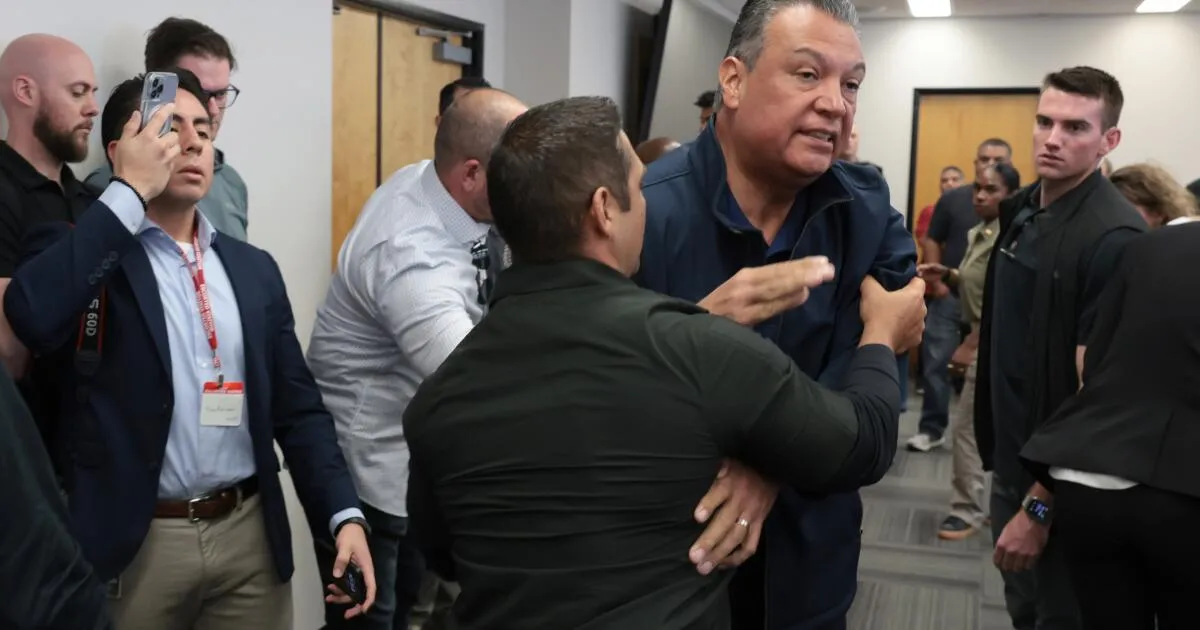
In a dramatic incident that unfolded recently, U.S. Senator Alex Padilla was forcibly removed from a press conference held by Homeland Security Secretary Kristi Noem. The confrontation highlights a critical issue in today's political climate surrounding immigration and the treatment of individuals of Mexican heritage. Padilla, who simply sought to identify himself and question Noem about the ongoing immigration raids across Southern California, found himself in a shocking situation. Federal agents pushed him into a hallway, forced him to the ground, and handcuffed him before eventually releasing him.
After the incident, Padilla and Noem engaged in a private discussion. However, Noem publicly claimed that Padilla “lunged” at her, a statement that was met with skepticism given the distance between them and the absence of any video evidence supporting her claim. This assertion aligns with Noem's recent statements, where she also accused Mexican President Claudia Sheinbaum of promoting violent protests in Los Angeles, despite Sheinbaum's genuine call for calm.
The treatment of Padilla is not an isolated incident; it reflects a long-standing pattern of hostility towards individuals of Mexican descent, particularly in the political arena. The narrative espoused by former President Donald Trump has fueled these sentiments. Trump's early campaign rhetoric, which depicted Mexican immigrants as “rapists” and criminals, has had a lasting impact on public perception. Regardless of one's background—whether a recent immigrant from Jalisco or someone whose family has been in the U.S. for generations—there exists a pervasive skepticism towards individuals with ties to Mexico.
This skepticism has historical roots, tracing back to events like the Mexican-American War and the subsequent land dispossession. Moreover, the legal segregation of Mexicans in the American Southwest during the early 20th century perpetuated stereotypes that continue to be propagated in mainstream media today. These outdated views led to a series of xenophobic measures in California during the 1980s and 1990s, as the state demographic began to shift dramatically.
Recent immigration raids have reignited these historical tensions. As protests erupted in response to the raids, Trump described Los Angeles as a city under siege from a “Migrant Invasion.” In a move reminiscent of military responses to foreign conflicts, the federal government deployed the National Guard and Marines to Los Angeles. This militarization of immigration enforcement has intensified the rhetoric around immigration, with U.S. Attorney Bill Essayli sharing images of protesters being arrested, further stoking the flames of division.
Notably, Texas Governor Greg Abbott preemptively called in the National Guard to counter planned protests in San Antonio, a significant hub of Latino political influence. Concurrently, discussions emerged regarding renaming a naval ship named after Cesar Chavez and a military base honoring a Latino figure, further illustrating the ongoing struggle over representation and recognition in American history.
The reaction to activists waving the Mexican flag has been met with fierce backlash, as seen in comments made by Vice President JD Vance and White House Deputy Chief of Staff Stephen Miller. This fear of cultural reclamation symbolizes a deeper anxiety felt by some Americans regarding the growing visibility and influence of Latinos, particularly Mexicans, in the U.S. Today, Latinos represent the largest minority group in the nation, with a significant presence in California and Los Angeles County.
Despite this demographic shift, the narrative of Mexicans as invaders persists. However, the reality is that many Mexican-Americans are assimilating into American culture, as evidenced by the names of their children and their active participation in civic life. The young adults currently protesting are often engaging in these issues in English, illustrating a blend of cultural identities rather than a rejection of American values.
Senator Padilla himself is a testament to this evolving narrative. As a son of Mexican immigrants, he grew up in working-class Pacoima and achieved academic success at MIT before returning to advocate for Latino voices in politics. His journey includes serving as California's first Latino U.S. senator after holding significant state positions. His recent treatment by federal agents serves as a critical reminder of the challenges faced by individuals of Mexican descent, even those in positions of power.
Padilla’s confrontation with Noem underscores a larger struggle against systemic racism and the fight for equality. His story illustrates that the narrative surrounding Mexican-Americans is not one of invasion but rather one of resilience, progress, and integration into the fabric of American society. If a respected figure like Padilla can be treated as an outsider, it raises alarm bells about the treatment of all individuals of Mexican heritage in the U.S.
As the political landscape continues to evolve, it is crucial for Americans to recognize the contributions of Mexicans and Latinos to the nation. The notion of who constitutes an “invader” must be reexamined, and the focus should shift towards celebrating diversity and fostering inclusivity. In a country built on the ideals of democracy and equality, it is imperative that we stand united against hate and discrimination, and recognize the shared humanity in all individuals, regardless of their background.